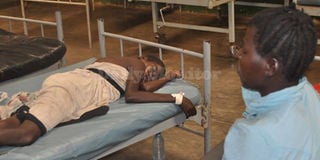Prime
Nodding disease patients raped and abandoned

A child suffering from Nodding Syndrome at Kitgum General Hospital last week. (REPRESENTATIONAL) PHOTO/TOBBIAS JOLLY OWINY
What you need to know:
- 2,143: According to the Health ministry, there are a total of 2,143 children affected by the epidemic in Northern Uganda with Pader District having 806, Kitgum 544, Lamwo 339, Gulu 58, and Lira with 13 cases.
- The patients are unable to defend themselves due to their condition.
At least 144 girls suffering from Nodding Syndrome are allegedly being taken advantage of, and sexually abused.
Information this newspaper has accessed indicates that the girls have given birth to 203 children after they fell victim to defilement, rape, and other forms of sexual harassment in Kitgum District since 2015.
Dr Micheal Okec, the Kitgum District Nodding Syndrome focal spokesperson, said the children born to these patients were, however, normal and healthy.
“Unfortunately, four of the 144 mothers have since died after drowning or falling in fire upon developing seizures, leaving their babies in the hand of their parents or other caretakers,” Dr Okec said.
Mr Joe Otto, the Nodding syndrome coordinator for Labongo-Akwang sub-county, said feeding was a major challenge.
“The burden is left to the respective parents of the victims to take care of them and their babies. Most of these girls give birth and cannot afford to clothe their babies or feed them since they are incapable of doing anything to raise money considering their condition,” Mr Otto said.
However, Mr Charles Okema, the coordinator for Labongo-amida Sub-county, said the victims lived on the sympathy of the authorities who budget to provide for them sanitary pads and other materials.
“Some of these girls come to the health facility very dirty and are sometimes unable to explain themselves to get soap and other sanitary items like towels and only the sub-county would come to their rescue,” Mr Okema said.
On April 29, the State Minister for Northern Uganda, Ms Grace Freedom Kwiyucwiny, donated 15 pieces of iron sheets to each of the 70 Nodding Syndrome patients who convened at the Office of the Prime Minister (OPM) regional offices in Gulu City.
The patients, who were brought from Omoro (12), Pader (22), Kitgum (18), and Lamwo (18) districts, benefited from the donation.
Ms Kwiyucwiny tasked the authorities to ensure that deliberate intervention measures are integrated into the districts’ plans.
“I ask the local governments to plan for these victims and shouldn’t leave them to the NGOs alone. Their situations get worse and worse every day” Ms Kwiyucwiny said.
Last year, Ms Lucy Achiro, the Member of Parliament for Aruu North Constituency in Pader District, raised the red flag over the worrying condition of the patients characterised by lack of food and medication since the country plunged itself into a lockdown.
Ms Achiro said six of the children she personally knew died during the lockdown due to lack of medication and poor feeding.
“I have visited some of the families affected by the disease in Latanya, Angagura, and Acholi-bur sub-counties but unfortunately, six of these childrendied since they no longer accessed medication and their caregivers could not afford to feed them,” Ms Achiro said.
She added: “To our dismay, Pader authorities are selling Covid-19 food instead of helping these children. Remember we have billions of shillings at the national taskforce but none of them have considered these children even when I petitioned Parliament.”
Researchers say with strict medication adherence and good feeding, children have higher chances of stabilising and regaining although the brain damage from the infection is permanent.
Status
A recent report on Nodding Syndrome released by CARITAS, Pader, that Daily Monitor saw indicated that the level of sexual assault and stigma was high among these children.
“They are stunted in growth and disoriented. These children have been stigmatised and called names,” the report reads in part.
Although specific numbers of victims who have been sexually assaulted were not indicated in the report, it pointed that Pader District had a higher prevalence of the problem than any other district in Acholi.
“These children have not been doing well of recent and the taskforce gave some food to the worst cases but I don’t think it was enough. Better measures are still lacking in response to their situation,” Mr Justine Ocen, the district speaker, said.
Mr Ocen said defilement has been the worst form of child rights abuse.
“It is very unfortunate that our children in such conditions are being sexually-abused. Meanwhile, the law is failing to take its course. On the other hand, many cases die from the police due to associated bribery,” Mr Ocen added.
Nodding Syndrome is a mysterious illness that affects the brain and central nervous system of children, primarily between the ages of five and 15.
The disease diminishes mental capacity and over time many children develop severe growth retardation.
Justice
In 2018, a group of parents and guardians of children suffering from Nodding Syndrome in Kitgum and Omoro districts demanded that the Judiciary institutes a specialised court to try those who are accused of raping and defiling the patients.
The parents and guardians claimed that many of their children have been raped and defiled but the culprits have not been prosecuted.
The first case of the nodding syndrome illness was reported in Kitgum District in 1998 in Tumangur Village in Labongo-Akwang sub-county, Kitgum District, by Joe Otto, who was by then the Village Health Team-VHT but the district started making interventions four years later (2002).
Nodding Syndrome is a mysterious illness that affects the brain and central nervous system of children, primarily between the ages of five and 15. The disease diminishes mental capacity and over time many children develop severe growth retardation.



